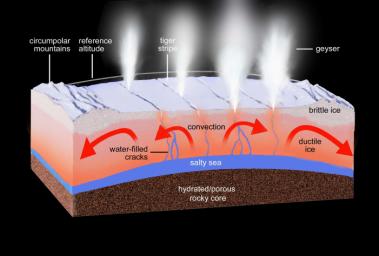What Lies Beneath: Regional View (Artist’s Concept)
Caption:
This artist's rendering shows a regional cross-section of the ice shell underlying Enceladus' south polar terrain, illustrating our current knowledge of the physical and thermal structure and processes ongoing below and at the surface. Narrow cracks extend upward from the sub-surface sea all the way to the surface, through both ductile and brittle layers of the ice shell. Liquid water under pressure fills the cracks, keeping them open even through the ductile layer and providing a conduit for vapor and sea water to reach the near-surface. Other processes, such as volatile exsolution of gases, can drive vapor and water droplets all the way to the surface, forming geysers and condensing close to the surface, depositing latent heat. This heat is observed by Cassini's long-wavelength infrared instruments as the small-scale hot spots (dozens of feet, or tens of meters in size) surrounding each geyser (see
PIA17189
).
The subsurface regions immediately surrounding the sea and the cracks bearing water and vapor are expected to be warm. Regional heating from tidal flexing is also expected to be present, but is so far undetected.
The ice shell lying above the sea is comparable in thickness to the distance between the tiger stripe fractures, suggesting that the latter might be cracks formed in the past when tensional stresses across the region were stronger.
The surface area of the south polar terrain is approximately that of Scotland.
The illustration includes findings reported in a paper by Porco, DiNino, and Nimmo, and published in the online version of the
Astronomical Journal
in July 2014:
http://dx.doi.org/10.1088/0004-6256/148/3/45
.
A companion paper, by Nimmo
et al
. is available at:
http://dx.doi.org/10.1088/0004-6256/148/3/46
.
Artwork by Ron Miller.
Background Info:
The Cassini-Huygens mission is a cooperative project of NASA, the European Space Agency and the Italian Space Agency. NASA's Jet Propulsion Laboratory, a division of the California Institute of Technology in Pasadena, manages the mission for NASA's Science Mission Directorate, Washington. The Cassini orbiter and its two onboard cameras were designed, developed and assembled at JPL. The imaging operations center is based at the Space Science Institute in Boulder, Colorado.
For more information about the Cassini-Huygens mission visit
http://saturn.jpl.nasa.gov
and
http://www.nasa.gov/cassini
. The Cassini imaging team homepage is at
http://ciclops.org
.
Cataloging Keywords:
| Name |
Value |
Additional Values |
| Target |
Enceladus |
|
| System |
Saturn |
|
| Target Type |
Satellite |
|
| Mission |
Cassini-Huygens |
|
| Instrument Host |
Cassini Orbiter |
|
| Host Type |
Orbiter |
|
| Instrument |
|
|
| Detector |
|
|
| Extra Keywords |
Artwork, Color, Infrared, Thermal, Water |
| Acquisition Date |
|
| Release Date |
2014-07-28 |
| Date in Caption |
|
|
| Image Credit |
NASA/JPL-Caltech/Space Science Institute |
| Source |
photojournal.jpl.nasa.gov/catalog/PIA17190 |
| Identifier |
PIA17190 |

 Planetary Data System
Planetary Data System
